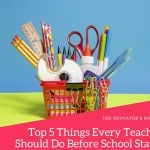As we wade in the waters of COVID-19 and reopening our schools, here are some articles that give us evidence on what works and what doesn’t.
We all know schools are on the front lines of dealing with our collective trauma. This thorough guide from the National Child Traumatic Stress Network (NTCSN) offers researched rationale for a trauma-informed approach to classroom and school leadership. It covers a lot of important ground (caring for staff and students’ physical and emotional well-being; identifying and addressing trauma; creating safe, responsive learning environments) in order to prioritize student mental health, safety, and wellness. Read this to make sure your practice is student-centered and trauma-informed.
- Equity Gap: Closing COVID-19 Equity Gaps in Schools
This project from Education Week highlights the need for educational equity at all levels. Much like Black Lives Matter’s claim that no one is free until Black Americans are free, this framework focuses on the highest need students first. It includes several “deep dives” on serving English language learners and students experiencing homelessness. It also emphasizes the importance of parent trust across racial and socioeconomic groups. What are we doing to close the opportunity and equity gaps?
Systemic health, social, and racial injustices mean that BIPOC and marginalized groups are more susceptible to the physical and economic effects of COVID. The President of the National Association of School Nurses penned this piece on the heels of NASN’s position brief Eliminate Racism to Optimize Student Health and Learning. This letter explains the disparities in school health, discipline, and educational outcomes that are only being exacerbated by the current pandemic. The NASN takes an admirably strong stance and argues antiracism should start in schools.
The Brookings Institution conducted a study with over 5 million 3-8th graders who took MAP growth assessments in 2017-2018 to project learning outcomes for 2020-2021. They find that students could drop significantly in their reading and math, retaining anywhere from 70% to 25% of what would be expected in a typical year. This has been called the “COVID Slide” that could create a whole generation of kids with irrecoverable learning loss. While there are too many early variables to be definitive, it’s important to recognize the systemic factors affecting student learning.
Mckinsey and Company take this “COVID Slide” and apply it to greater impacts of education. Namely, the US economy. This projects learning loss in different school scenarios (in person, hybrids, returns in fall or spring) as well as across different socioeconomic and racial groups. It even projects for future earnings and GDP loss. Throughout this pandemic, certain lawmakers insisted businesses remain open, but they failed to realize that if we prioritized opening schools from the beginning, our economy would be in a very different place today. As schools are a part, or pawn of, our capitalist system, it’s critical we recognize what those with power often prioritize as outcomes for our students.
Speaking of capitalism, when schools were thrown into crisis this spring, technology companies were at the ready with “easy” solutions. Personal devices and home internet became necessities for effective teaching and student engagement. However, this paper explores the technologization of our schools. It urges leaders to question if hastily onboarded technology can, or should, fix our “broken” education system. Is everything we’re adopting good for the future of education, and or just necessary for now?
- Student Support: Considerations for Educators in Supporting Student Learning in the Midst of COVID19
With schools hybrid or fully remote, teachers’ differentiation superpowers are more important than ever. Educators need to recognize and address the emotional, physical, and academic needs of all students, especially in light of other social inequities that play out in our school systems. This paper identifies widespread classroom academic needs and divides best intervention practices into universal, targeted, and intensive tiers for now and for a future return to school.
- Student Health: Protecting the Health of Vulnerable Children and Adolescents During COVID-19–Related K-12 School Closures in the US
Schools offer so many essential services to students that closures mean a loss in vital services like school meals and school based health centers. Districts have had to be creative in how they offer everything from lunches and internet access to health exams and counseling. It’s clear there is a disproportionate health impact of closures on vulnerable children, and it’s up to school leaders to fill that gap.
- Teachers’ Work: Not Remotely Familiar: How COVID-19 is Reshaping Teachers’ Work and the Implications for Teacher Education
The crisis teaching we all found ourselves thrust into this spring completely redefined the nature of our jobs. Almost everything about the daily work of teachers has changed. So, what does this mean for the future of the profession? This paper explores culturally responsive teaching, student-teacher mentorship, educator stress, and efficacy regarding teacher education. The “COVID generation” might not impact just K-12 teachers, but the future of the teaching profession.
- School Closure: Association Between Statewide School Closure and COVID-19 Incidence and Mortality in the US
We’re reaching nine of this pandemic, and for many states, this means nine months out of school. After all this time, several critical questions still loom large. Does closing schools help slow the spread of COVID? If so, should they remain closed? The JAMA network investigated all fifty states and their school closures from March 19 to May 7th, 2020. They concluded the closures did correlate to COVID case decreases. The states that closed earlier also saw the largest relative reduction in both cases and deaths. However, they can’t definitively say that other interventions (mask mandates, business closures) weren’t also a significant factor. So, as with most questions this year, the answer is…possibly?





